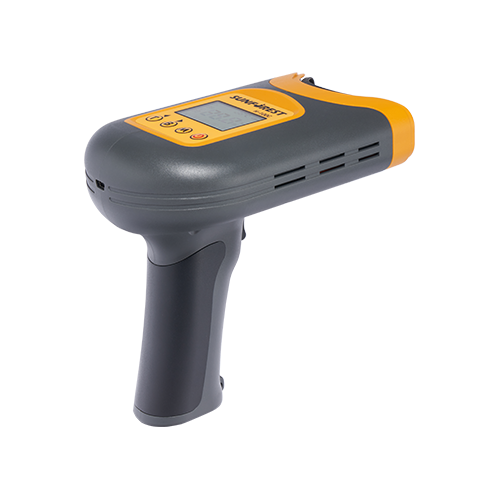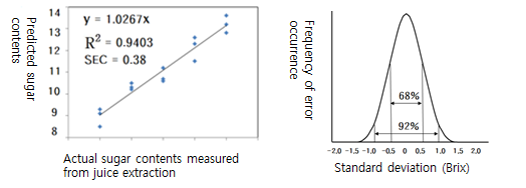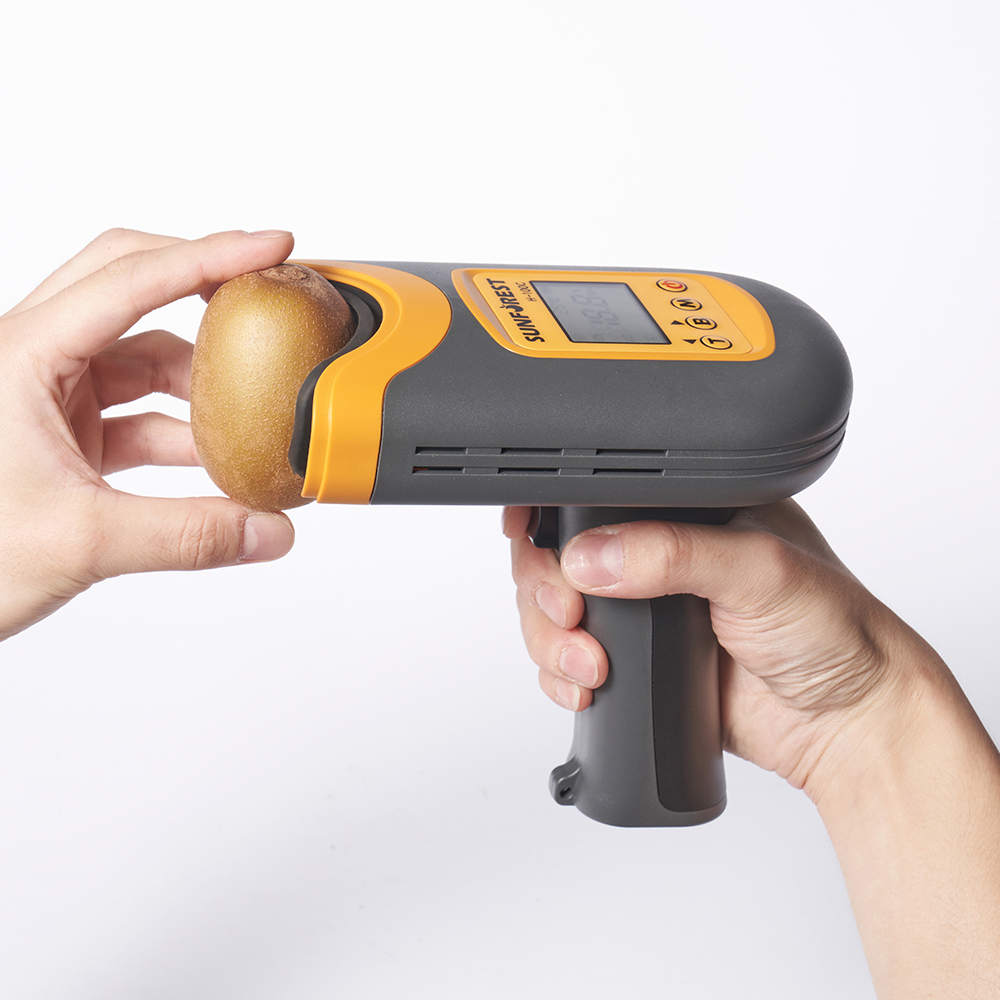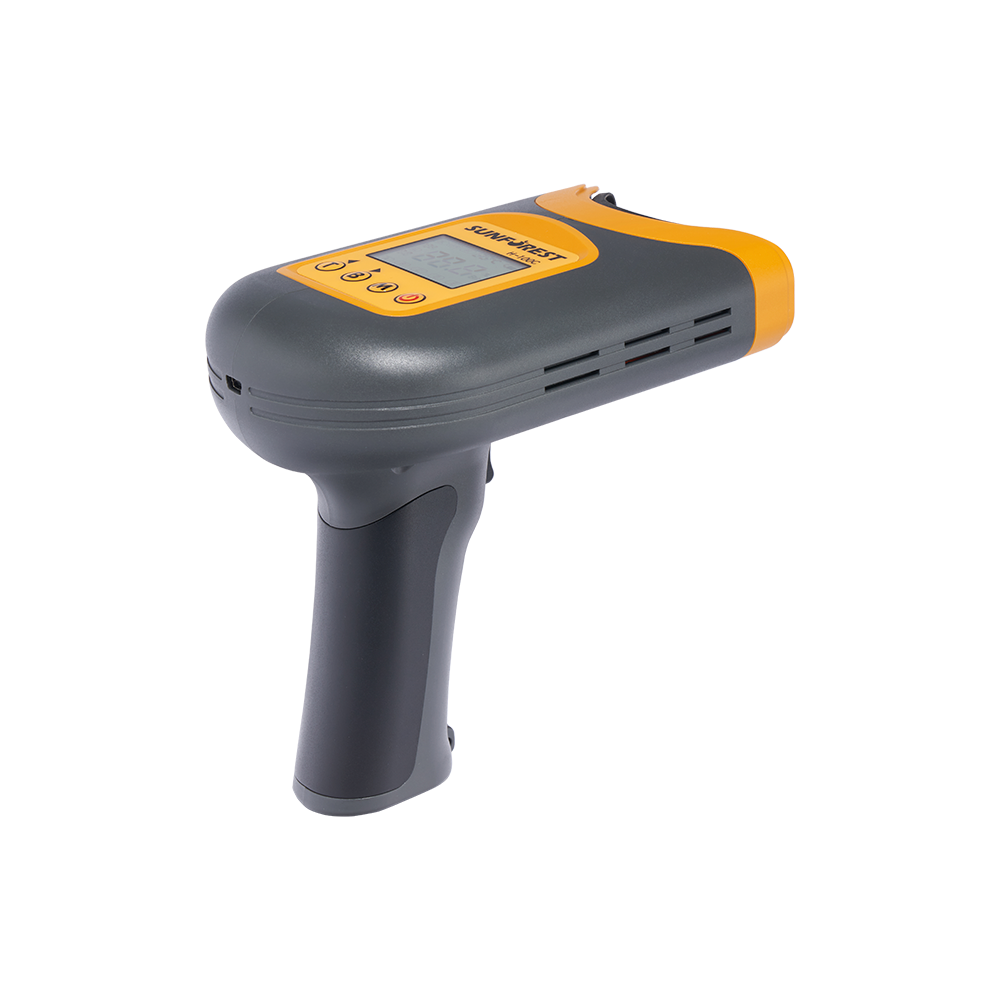H-100C Kiwifruit DM/Brix/Hue Meter

Portable Nondestructive Fruit Quality Meter
The H-100 is a portable, non-destructive instrument that measures the internal quality of fruit using semi-transmissive, diffuse reflection, near-infrared (NIR) spectroscopic analysis technology. It can be used to help determine harvest times and to make decisions based on the analysis of fruit growth quality in the orchard.
Trusted by thousands of clients in the fruit industry, the SUNFOREST H-100C has proven to be a reliable instrument for determining and tracking Dry Matter /Brix on kiwifruits.
- Gold DM/Brix/Hue
- Hayward DM/Brix
- Red DM/Brix
※ Fully tested and validated on the Zespri varieties. Will be as effective on other kiwifruit varieties with customer validation tests, followed by offset adjustment or model building.
- Provides simple and rapid, Dry Matter/Brix/Hue testing
- Can be used for bulk, on-orchard measurements
- Measures without damaging the sample
- Quick and easy, diagnosis of the internal fruit quality
- Accurate and repeatable results with automatic temperature compensation
- Bluetooth connection to a dedicated mobile app
- Smartphone app allows the user to view and save measurements, display statistical distributions (histograms), correct deviations and select fruit
- One-year warranty with predictive calibration upgrades as necessary
- Includes meter, storage case, rubber shading, measuring area cover, cleaning tool, dedicated charger and user manual
| Category | Specification |
|---|---|
| Metrics |
Sugars (Brix), Dry Matter (%), Hue Hue is available for Gold kiwifruit only |
| Measurement range |
Sugars 5.0 to 25.0 Brix Dry Matter 10.0 to 25% Measurement range may vary by fruit variety. |
|
Accuracy (Standard error of calibration) |
Sugars ±0.6~1.4Brix Dry Matter 0.7-1.0%x Hue : 1.0-1.6 Accuracy may depend on fruit varieties and environment |
| Measure Speed | ~2.0 seconds |
| Environment | 5°C to 40°C (41°F to 104°F) | 85% RH |
| Interface | USB C-type | Bluetooth 4.1 |
| Sensor | Enhanced CMOS Spectrometer (640 – 1,050 nm) |
| Light Source | Xenon Lamp |
| Power | Rechargeable Lithium-Ion (3500mA) | 12VDC/3.0A Adapter |
| Weight | 450g(0.99lbs.) |
| Dimensions | 110 x 174 x 172mm (4.3” x 6.8” x 6.8”) excluding cap |
※ Correlation coefficient and standard error of the calibration model
The predicting performance of a nondestructive measuring instrument can be evaluated by correlation coefficient((R2) and standard error(SEC) of the calibration model.
The correlation coefficient indicates the level of co-relationship between the sugar contents predicted by calibration model and actual sugar contents of extracted juice measured by refractometer. Bigger the correlation coefficient of the calibration model, better the definiteness between high sugar contents and low sugar contents. Thus we can tell the calibration model with bigger correlation coefficient is better optimized to object fruit. The standard error is the statistic distribution of error range between sugar contents predicted by calibration model and actual sugar contents measured from the juice extracted. A standard deviation of 0.5 Brix means that among the total number of measurement, about 68% can predict the sugar contents within the error range of ±0.5 Brix. Thus, in some cases, a measurement error may have larger value than 0.5 Brix. To create a calibration model with good correlation coefficient and useful standard error, it is recommendable to make models collected from various range of sugar contents and considerable number of fruit samples. The correlation coefficient and standard error should be made to be suitable for desired purposes of instrument use ; make decision of harvesting time or selection of favorable fruit at post-harvest And the calibration model should be created in consideration of the varieties of fruit and area/time of cultivation.





